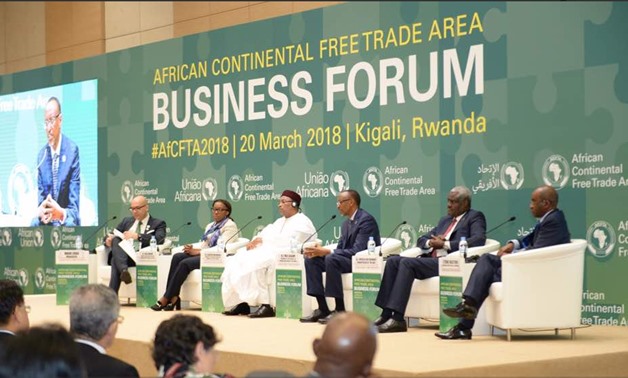
Through the Forum in Kigali that witnessed the signing of CFTA - Photo courtesy of African Union Twitter Account.
CAIRO – 22 March 2018: The announcement of signing a trade agreement among African Countries, including Egypt, to ease the trade exchange between them, raises questions concerning the agreement and how Egypt and other African countries can benefit from it.
Egypt Today reviews these questions and provides answers to understand how the trade agreement, the African Continental Free Trade Area (CFTA), can be applied, taking a deeper look at its advantages.
Q: What is the African Continental Free Trade Area (CFTA) agreement?
A: It is an agreement to ease the trade exchange between the countries that signed it according to a scheduled timeline and not through an immediate activation of the agreement.
CFTA is considered to be the biggest deal ever signed since the World Trade Organization (WTO) was established as it was signed by 43 countries.
Q: Does CFTA include all African Union’s countries?
A: The CFTA is set to include all 55 member states of the African Union, but Nigeria and Uganda had pulled out from the Kigali summit at the last minute. Nigeria said it needs more time to review the terms.
The African Continental Free Trade Area (AfCFTA) is an agreement to remove barriers and tariffs among the African countries, bringing together 1.2 billion people with a combined gross domestic product (GDP) of more than $2 trillion.
This will lead to the establishment of the African Customs Union and the application of the unified tariff to the imports of the African continent from outside the continent.
Q: How did the negotiations of the agreement start?
A: Negotiations were launched by the African Union Heads of State and Government in June 2015 and reached a draft of the agreement itself by the end of 2017.
In early March 2018, the negotiating forum met for the 10th time to finalize outstanding matters and conclude legal scrubbing in preparation for the signature of the agreement on March 21, 2018.
The African countries reached an agreement on a dispute settlement mechanism, finalizing several annexes to the protocol on goods, as well as on a Transition and Implementation Work Program to finalize offers for goods and services, and to prepare product-specific rules of origin.
Negotiations are expected to conclude by the end of 2018, focusing on provisions for investment, competition and intellectual property rights and on studying the launch of e-commerce in the African countries.

Timeline of CFTA agreement - African Union
Q: What are the objectives of CFTA?
A: The African Union said that CFTA targets to create a single continental market for goods and services, with free movement of business persons and investments, paving the way for an economic African union.
It aims at expanding intra-African trade through liberalization and facilitation of trade across Africa.
It is also expected to enhance competitiveness at the industry and enterprise level through exploiting opportunities for scale production, continental market access and better reallocation of resources, according to the Union.
Q: How can Egypt and African countries benefit from the agreement?
A: With a market of 1.2 billion people and a combined gross domestic product (GDP) of more than $2 trillion, it opens the door of surging the amount of imports and exports.
Egypt can double its exports to African countries through this agreement as Egypt’s exports to African Countries are currently worth about $4 billion.
Domestic trade in Africa reaches 20 percent nowadays, with expectations to be accelerated by activating this agreement.
Q: What is the feedback of international organizations upon signing the agreement?
A: International Rating agency Moody’s said that the African Continental Free Trade Area could boost intra-regional trade, which remains far lower than that in developing Asian countries. It also could improve the region’s credit profiles, but obstacles will limit the benefits, the agency said.
“There is significant potential for further trade integration in Africa, which the CFTA could stimulate,” Moody’s said.
It added that South Africa, Kenya and Egypt are most likely to benefit from further trade integration in Africa, adding that morocco, Namibia, Tunisia, Côte d'Ivoire, Senegal and Cameroon also stand to gain from increased intra-African trade.
The UN Economic Commission for Africa (UNECA) anticipated that if the agreement is implemented, it will increase intra-African trade by 52 percent by 2022, compared to trade levels in 2010.

Comments
Leave a Comment